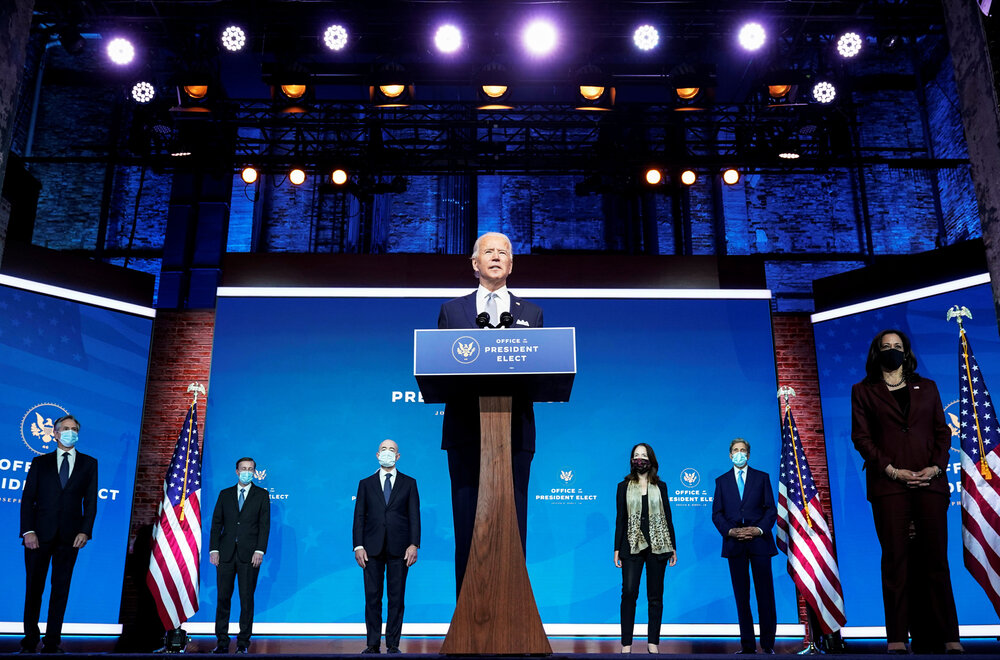There’s huge disagreement among Biden aides over JCPOA revival: Politico

TEHRAN - President Joe Biden says that the U.S. will rejoin the Iran nuclear deal if Tehran resumes complying with the terms of the agreement, but inside the Biden administration, debates have raged among top aides over whether this is the best path or whether to take other routes that may sidestep the original deal, according to Politico.
Meanwhile, supporters of the 2015 deal are worried that Biden doesn’t rush to return to it. They fear key Democrats and Iranian politicians are waiting an upcoming election to shape their policies. They also worry about ongoing Iranian efforts, including restrictions on the access of IAEA inspectors, to pressure Biden to act faster and lift sanctions as part of a return to the original deal, Politico said on Thursday.
The State Department has announced that the United States would accept an expected European Union invitation to attend a gathering of parties to the original deal.
Politico claimed a full restoration of the Joint Comprehensive Plan of Action (JCPOA) may be a far messier, and it needs a longer-lasting set of negotiations than what many observers had expected – if it happens at all.
The JCPOA is the official name for the 2015 nuclear agreement.
“There is a window of opportunity that simply will not last,” warned Daryl Kimball, executive director of the Arms Control Association. “The slow pace of deliberations on the part of the United States will jeopardize Biden’s stated goal, which is to restore the agreement and to build on the JCPOA.”
But there are “a lot of different views” within the Biden administration, one of the people familiar with the discussions said, adding, “I think there’s an instinct to return to the deal, but that’s not a preordained outcome.”
A Capitol Hill Democratic aide expressed concern about U.S. government’s policy towards Iran and told Politico, “I don’t get the sense they have a timeline, like they don’t have dates and times” for rejoining the accord, added, “How fast to move — and how big?”
According to Politico, Biden’s administration has faced a crucial question: Whether to aim for a return to the original nuclear deal first or seek a broader deal from the start. A broader deal could possibly include non-nuclear aspects, such as limits on Iran’s missile program, and its regional influence.
The media company suggested, “One option on the table is to have some sort of interim agreement that can build confidence on both sides. The interim agreement would not necessarily look like the original deal. It could involve giving Iran some limited sanctions relief — such as allowing oil sales — in exchange for Tehran halting some of its nuclear activities such as enriching uranium to 20 percent purity.”
Some Biden’s administration officials insisted that the debate has finished. They claim the U.S. is prepared to return to the original nuclear deal if Iran complies with it. But exactly what steps must be taken to achieve that goal and at what pace are still a matter of debate and discussion, Politico wrote.
Politico explained the opinions of the U.S. officials concerning Iran issue and wrote, “Brett McGurk, a senior Middle East official on the National Security Council staff, is among the more hawkish voices on Iran – and that national security adviser Jake Sullivan at times takes a harder line than many of his colleagues. He recently declared that containing Iran’s nuclear program is a “critical early priority” of the U.S. administration. Rob Malley, Biden’s special envoy for the Iran talks, is known to be more of an advocate for a return to the original nuclear deal. Others likely to be on his side include Jeff Prescott, a top official in the U.S. Mission to the United Nations. However it is not clear where Secretary of State Antony Blinken stands.”
Regarding the U.S. efforts to revive the JCPOA, Politico highlighted the role of the U.S envoy and said, “Malley has spent his short time as far as envoy reaching out to the other parties to the 2015 agreement, including Russia and China, but not to Iran itself. He also has been in touch with representatives of Israel as well as Arab countries.”
Pointing to the critics of the JCPOA, Politico said, “Struck during the presidency of Barack Obama, its supporters hailed it for dramatically curtailing Iran’s nuclear program, but its opponents cast it as too weak and too generous in terms of the sanctions relief it offered Iran in return.”
Interestingly, Politico acknowledges Iran has complied with the agreement and writes, “Iran has technically remained a party to the agreement, which is still functional to a limited degree. But since the U.S. walked away from it, Tehran has taken several steps that have put it out of compliance. The moves aimed to push America back to the negotiating table while also pressuring European leaders to find ways to ease the substantial economic sanctions.”
Some advocates of a speedy return to the 2015 agreement argue that time is of the essence, in part because Iranian presidential elections are set for June.
Anti-American politicians likely to win than the ones who negotiated the deal, Politico stressed.
Those who are against any quick U.S. return to the accord claim that no matter who wins the Iranian election, the economic sanctions and the coronavirus pandemic will compel Iran to return to the negotiating table. For instance, Gabriel Noronha, a former State Department official, argues “Iran is in desperate financial and political straits right now. We have no reason to relent on the pressure, especially to get back to a deal which is already well on the way to expiring.”
EE/PA
Leave a Comment